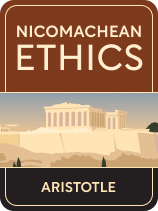

This article is an excerpt from the Shortform book guide to "Nicomachean Ethics" by Aristotle. Shortform has the world's best summaries and analyses of books you should be reading.
Like this article? Sign up for a free trial here .
What are some of the best quotes from Nicomachean Ethics? What captures Aristotle’s message?
In Nicomachean Ethics, the ancient Greek philosopher Aristotle attempts to determine the best possible way a person can live their life. He’s not trying to explain the best way to deal with any given situation. Instead, Aristotle aims to provide a general overview of what an ideal life is and how people can achieve it.
We’ve collected some of our favorite Nicomachean Ethics quotes, along with some context and explanation. Take a look.
Nicomachean Ethics Quotes
These five Nicomachean Ethics quotes are worth considering and perhaps applying to your own life.
“Freedom is obedience to self-formulated rules.”
Aristotle argues that there aren’t simple, universal rules someone can follow to be virtuous. Instead, a virtuous person must determine what is appropriate for each individual situation and then do it.
“The good of man is a working of the soul in the way of excellence in a complete life.”
For a person to be as good as possible, they need to consistently do good things over the course of an entire human lifespan. Therefore, Aristotle suggests that people who die young can’t achieve happiness—they have less time to live and therefore will do fewer good acts. This doesn’t mean people who die young necessarily live bad or miserable lives, but it does mean that they weren’t able to achieve the best possible (and therefore happiest possible) human life.
“The self-indulgent man craves for all pleasant things… and is led by his appetite to choose these at the cost of everything else.”
To become morally virtuous, a person must learn to take pleasure in virtuous things and to feel pain at vice or wrongdoing. This process aligns the rational and emotional parts of themselves: The rational part knows virtuous things are good, and the emotional part enjoys and desires virtuous things because it’s been conditioned to take pleasure in them. Therefore, a morally virtuous person doesn’t do virtuous things because of unemotional deliberation—they do virtuous things because it feels good and because they hate what’s immoral.
“We must not listen to those who advise us ‘being men to think human thoughts, and being mortal to think mortal thoughts’ but must put on immortality as much as possible and strain every nerve to live according to that best part of us, which, being small in bulk, yet much more in its power and honor surpasses all else.”
Aristotle suggests that philosophical inquiry is a divine activity: It’s the activity of the gods and is therefore superior to all strictly human activities. Aristotle says the gods are virtuous by their very nature, as they are perfect.
Aristotle concludes that the gods are virtuous because they act in accordance with the virtue of wisdom—that is, they contemplate. Therefore, wisdom is the most divine virtue and contemplation is the most divine activity. And since the gods are perfectly virtuous, perfectly happy, and they only contemplate, Aristotle concludes that a perfectly happy life is a life of activity aligned with the virtue of wisdom (contemplation).
“Happiness, then, is found to be something perfect and self-sufficient, being the end to which our actions are directed.”
Happiness, says Aristotle, is the goal of life. He arrives at this conclusion by examining the nature of human action. Aristotle claims that the purpose of all human actions is achieving some kind of good—that is, we do things because we think they are the “right” or “best” thing to do in a given circumstance. However, these “goods” exist in a hierarchy: If the reason we do action A is so that we can then do action B, it follows that action B is better than action A—action A is just a means to an end.
Aristotle concludes that the top of the hierarchy of “goods” is a means that is also an end—something that we want for its own sake. This ultimate good, he argues, is happiness. Since happiness is the highest good, the reason for all action inevitably leads back to it. If you ask someone why they want to be happy, they can’t and won’t provide another, greater reason. Because happiness is the ultimate good, it follows that a good life is a happy life and vice versa.

———End of Preview———
Like what you just read? Read the rest of the world's best book summary and analysis of Aristotle's "Nicomachean Ethics" at Shortform .
Here's what you'll find in our full Nicomachean Ethics summary :
- Aristotle's philosophies on topics such as happiness, virtue, and wisdom
- What it means to be morally virtuous and how someone can develop moral virtue
- How wisdom contributes to the possibility of a happy life






